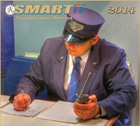
Pat Corp, Virginia State Legislative Director of the SMART Transportation Division, submitted the following letter to the editor of The Roanoke Times. It was published Aug. 22, 2014.
Re: the July 28 article “Coal exports bypass emission rules” from the Associated Press. The article’s leanings struck me as somewhat less than pure investigative reporting.
U.S. exports are actually down and projected to decrease through 2015 for a reduction of almost 25 percent from 2012, due in most part to other countries upping their production levels (source Energy Information Adminstration).
Since world demand for coal is expected to grow and demand for our coal to almost double, building export terminals in the U.S. for Powder River Basin coal is being worked out now and argued over, yet the author fails to note Canada has the ability to export as well, and this is outside of the administration’s authority. British Columbia is planning expansion of the coal terminal at New Westminster and a large new facility at Prince Rupert.
History is replete with examples of failed attempts to stop the supply of commodities in the face of demand (marijuana being a prime example). Perpetuating the misperception that restricting U.S. coal exports will result in the world’s reduction in the use of coal is promoting an agenda of certain groups whose ultimate goal, though arguably utopian, is the unrealistic near-term elimination of fossil fuel use.
Any coal export or mining of coal that is for the purpose of burning for thermal (power plant) or metallurgical (steel production) will add to global emissions, versus where it not mined at all. The real question is in what amounts. The article could have argued the emissions from production and transportation of U.S.-mined coal exceed that of Australia or Columbia, if it does.
Perhaps the large supply of U.S. reserves keeps the costs of coal lower on the open markets than if that supply were not accessible, and therefore more economically feasible to use as opposed to less carbon producing alternatives, but it is a leap to say it is “fueling demand.” Though this country holds 28 percent of recoverable coal reserves, this leaves 72 percent on the world market, hardly a monopoly.
The author, after exploring the administration’s reasoning for not interfering in the domestic coal export markets as an avenue for lessening worldwide carbon emissions, leaves us with the thought that U.S. coal exports have a direct effect on rising sea levels in the Norfolk area, and therefore the false suggestion that the reduction of such would have the reverse effect, and further implies the ship sailing away from U.S. shores to other countries is the cause of global warming.
Continuing and accelerating the research and application of technologies that will allow for the use of all fossil fuels, with the goal being to minimize any environmental impact, and at the same time lessening demand in developed and developing countries through technology is a realistic approach to solving the carbon emissions quandary worldwide.
Examples of each are carbon sequestration, which The Roanoke Times covered well not so long ago, and wraparound solar panels, which can envelope an entire multistory building. China is still building coal-fired power plants at a substantial rate, along with India, and even Germany is increasing its electricity capacity from coal generation.
The U.S. needs to keep trade open to these countries and maintain relationships in the coal markets so we can influence the expansion of pollution and carbon mitigation technologies worldwide.
Printing articles that accurately explore carbon emission/pollution reduction possibilities (which the author failed to do) would certainly be of greater service in informing readers to the challenges of providing the world with affordable electricity, and at the same time maintaining a healthy planet for all to be able to enjoy the benefits of that electricity.
Newspapers still play a significant role in keeping the public informed as to the workings of the world. Unfortunately, articles such as the referenced one here do all a disservice, certainly those in our domestic coal industry, by building upon the myth that limiting U.S. coal exports is a realistic answer to global warming.
 The SMART?Transportation Division is seeking quality railroad, bus and airline photos, taken by its members, for placement in its annual calendar and other uses.
The SMART?Transportation Division is seeking quality railroad, bus and airline photos, taken by its members, for placement in its annual calendar and other uses. More trained eyes should be on the tracks in Minnesota in coming months, state and federal authorities say.
More trained eyes should be on the tracks in Minnesota in coming months, state and federal authorities say. California lawmakers on Friday (Aug. 29) passed legislation requiring railroad companies to tell emergency officials when crude oil trains will chug through the state.
California lawmakers on Friday (Aug. 29) passed legislation requiring railroad companies to tell emergency officials when crude oil trains will chug through the state.